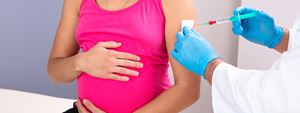
Dear Doc,
I am 28 weeks pregnant with my 3rd child. Today at my OB’s office the provider wanted to give me the tetanus, diphtheria, and pertussis (Tdap) vaccine. I know I got a tetanus shot a couple years ago and I thought that was good for 10 years. I do not remember receiving a tdap vaccine in my other pregnancies. I don’t like the idea of putting anything into my body while I am pregnant. I told the provider that I needed to think about it first. Do you think I should get the vaccine now or wait until I have delivered?
Answer:
Pregnant women are being encouraged to get a tdap vaccine during pregnancy to protect their baby from whooping cough, also known as pertussis. Whooping cough is a highly contagious bacterial respiratory infection. While the disease can affect both adults and children, the vast majority of severe disease and mortality occurs in infants less than 3 months old. Infants that get whooping cough may not actually cough at all but instead can have trouble breathing and turn blue. About 50% of babies that get whooping cough will end up hospitalized. Approximately 1-2% of hospitalized infants will ultimately die from the disease.
When a pregnant woman is given the tdap vaccine this protects the baby in two ways. First, it supplies the baby with immunity through the transmission of antibodies. Antibodies are part of our immune system that circulate in our blood and fight infection. Second, the mom is protected from whooping cough which means she will not transmit the illness to her infant. It is important for all caregivers of the infant to be up to date on pertussis vaccination. This creates an immunity cocoon around the infant. If everyone around the baby is immune from pertussis, then the risk of exposure for the baby goes down dramatically. Vaccination of Mom and other caregivers is the only way we can protect infants from whooping cough until they reach 2 months of age. At that point the infant can start receiving their own vaccines.
In 1934 there were more than 250,000 cases of whooping cough in the United States. With the introduction of the whole cell vaccine in the 1940s, the number of cases dropped to a low of 1010 cases in 1970. Since that time there has been a steady increase in the number of whooping cough cases in the United States. In 2012 there were 48,000 cases in the U.S. and in 2014 an epidemic of pertussis was declared in California. Worldwide about 195,000 deaths occur each year from whooping cough. These are predominately infants or unvaccinated children.
There are two main reasons for the increase in the number of cases in the United States. One, a change was made in the vaccine in 1997. The initial pertussis vaccine was a ‘whole cell’ vaccine and was associated with local swelling, pain, fever, fatigue, and convulsions. The new ‘acellular’ vaccine was found to have fewer side effects but immunity was noted to decrease quickly. The new vaccine does have fewer side effects but more frequent revaccination is required to maintain immunity. This is why it is recommended that pregnant women get vaccinated during each pregnancy even if those pregnancies are closely spaced. Second, the anti-vaccine movement within the United States has had a significant effect on vaccination rates. False claims that linked vaccines to autism made many prospective parents very suspicious of vaccines. This has led to an increase in the number of parents opting out of vaccinating their children. The subsequent result is an increase in cases of a variety of preventable infectious diseases like the recent measles outbreak at Disney Land.
I strongly encourage you to follow your provider’s advice. Whooping cough is a preventable deadly infection for newborns. The best way to prevent your baby from getting this disease is for you to be vaccinated in pregnancy. The baby’s father and other family members should be encouraged to update their tdap vaccination at least 2 weeks prior to the baby’s birth. If that is not possible the hospital can offer the vaccine to your family members when you are in the hospital for delivery
Tara Gellasch, MD, is the Associate Chief of Obstetrics and Gynecology at Newark-Wayne Community Hospital (NWCH) and sees patients at The Women’s Center at NWCH, a Rochester General Medical Group practice. Dr. Gellasch earned her Medical Doctorate from McGill University in Montreal, Quebec and completed her residency in Obstetrics and Gynecology at Emory University. This column is meant to be educational and not intended to be used to make individual treatment decisions. Prior to starting or stopping any treatment, please confer with your own health care provider.